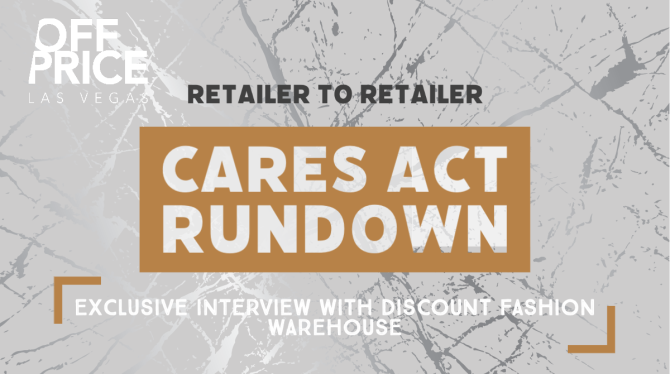Retailer to retailer: CARES Act rundown
Click on image to download high resolution version
by Mikaela Kornowski
What’s been one of the most challenging aspects of the coronavirus/COVID-19 pandemic for many has been the looming uncertainty surrounding the virus itself, the health of our family and friends, and the economic fate of our retail businesses. In late March, Congress passed the Coronavirus Aid, Relief and Economic Security (CARES) Act, which is finally bringing relief to some retailers, like Discount Fashion Warehouse (DFWh).
It seemed the information and recommendations for COVID-19 were changing every day, and so too, the rules and regulations on legislation addressing the virus. Jeff Bradshaw, President of DFWh, found himself seeking out as many resources as possible to navigate the CARES Act early-on for the 9-store discount apparel chain in Ohio.
“I got a lot of information from our bank, our accounting firm, and local chamber of commerce,” says Bradshaw. “It’s been difficult, but the information is out there and many agencies are doing their best to help. While you’re doing your own research, you’re going to find some inconsistencies, but when you find sources citing the same information, you’ll know you’re on the right track.”
If your company already has existing loans, depository accounts, or a long-standing relationship with a bank, Bradshaw recommends reaching out to them first. “Now is an important time to use your existing relationships,” he says. “Banks are more willing to work with retailers they’ve already established connections with. Many banks are prioritizing their existing clients, and if your bank is already an established SBA lender, you probably have an advantage.”
What exactly does the CARES Act offer retailers?
According to the National Retail Federation’s explanation, the legislation includes:
- - $350 billion allocated to the Paycheck Protection Program—which means loans for retail businesses that qualify, based on number of employees
- - Longer unemployment insurance coverage
- - Additional compensation for unemployed retail workers
- - New tax relief options for retailers
For Bradshaw, honing in on loan funds for DFWh and the Paycheck Protection Program were the most critical pieces of the CARES Act. “We had 275 employees when this hit,” he says. “After 28 years of doing this, you’re attached to your employees. You want to get them and your business back to normal as soon as possible.”
On the day interviewed, Bradshaw explained he was already expecting to begin receiving funds from his CARES Act application, which he officially filed about ten days prior. “I recommend retailers file as soon as possible if they haven’t already,” he said. “We were approved for a sizable loan, which will help carry us through the next 2-3 months. Unless refunded, that $350 billion pool of money will be draining quickly for other retailers.”
For Bradshaw, his work to secure the loan was two-fold:
- Identifying the company’s average payroll costs
- Providing documentation to back that sum up
But the loans don’t come without guidelines for the borrowers. “Once your retail business receives funding, you’re on an eight-week calendar to use the funds for the intended purpose: get people back to work,” he says. “How that will be documented is the second moving target—and my biggest pressure point. Not all of the loan must be spent on payroll, up to 25% can be used to pay interest, some operating costs, and leases as well, which is why many landlords are encouraging retailers to apply.”
With many states still mandating Shelter in Place guidelines, timing for getting employees back on the clock is still uncertain. “We’re already seeing Facebook posts from our customers asking when we’re opening and that they can’t wait to shop us again,” says Bradshaw. “It’s a different situation now, in terms of hygiene, common sense, and social distancing. Things just aren’t going right back to normal.”
But that didn’t stop his own hopeful sentiment for things to get back on track. “I really am looking forward to the next OFFPRICE Show,” said Bradshaw. DFWh has shopped the OFFPRICE Show in Las Vegas for over 20 years. Plans for the next OFFPRICE Show, August 15-18, 2020, at the Sands Convention Center are still moving forward as planned. Please visit offpriceshow.com for any updates.
Other helpful COVID-19 resources for retailers:
- - National Retail Federation: Coronavirus resources for retailers
- - US Chamber of Commerce: Coronavirus Small Business Guide
- - The Boutique Hub: Retail Resource Center
- - Scaling Retail: COVID-19 and small business webinar series
- - Soles4Souls: Nonprofit opportunities for retailers during COVID-19
- - Retail Minded: Free COVID-19 resource guide

